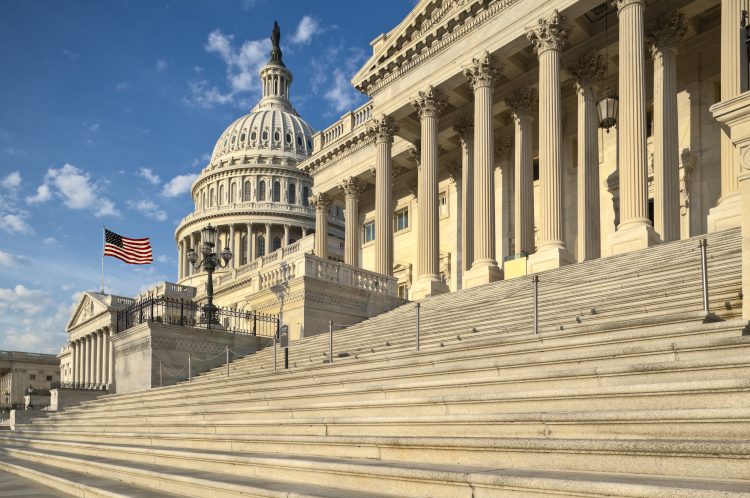This week on Facing the Future, we check in once again with Ben Ritz, the director of the Center for Funding America’s Future at the Progressive Policy Institute. Ben has written a number of things recently including an opinion piece for the Wall Street Journal urging the Biden Administration to take action to shore up the solvency of the Medicare and Social Security Trust Funds. He also wrote a recent paper for the Peter G. Peterson Foundation entitled: Opportunities for Bipartisan Fiscal Policy in 2023. Concord Coalition policy director Tori Gorman and chief economist Steve Robinson joined me for the conversation about where Ben sees potential areas of compromise for Republicans and Democrats on some fiscal policy ideas in our new state of divided government.
To start our conversation, I wanted to get Ben’s take on President Biden’s exhortation during his State of the Union Address to both parties in Congress to stand up for seniors by agreeing not to touch Social Security and Medicare. Trust funds for both key entitlement programs will be insolvent sometime in the next decade, according to projections from the Congressional Budget Office (CBO) and the Trustees of the Social Security and Medicare Trust Funds.
“The problem as I see it is that the White House has really gone all-in on this strategy of do nothing,” said Ritz. “Just before the State of the Union, the White House really panned the idea of a bipartisan Social Security commission, and in the sState of the Union the President was able to get the Republicans and the Democrats to applaud his line saying we’re not going to touch Social Security. The problem is that if we don’t do anything about Social Security, sometime between 2033 and 2035, depending on if you follow the projections from the CBO or the Trustees, the… trust fund is going to run out of money, and at that point benefits will be limited to what can be paid with incoming revenue. Which means we’re going to be seeing automatic benefit cuts of 20% when we get to that point. So if you do nothing, then you’re effectively endorsing that 20% benefit cut about a decade from now.”
A bipartisan group of senators has proposed legislation called the TRUST Act – co-sponsored by Concord Coalition 2022 Economic Patriot honorees Joe Manchin (D-WV) and Mitt Romney (R-UT) – that would set up bipartisan “rescue committees” to propose plans for improving the financial condition of federal trust funds facing insolvency in the near-term, such as Social Security and Medicare Hospital Insurance. Even though President Biden voted to enact the recommendations of a bipartisan commission as a member of the Senate in the 1980s, a spokesman for the White House recently called such commissions “death panels.”
“These commissions are designed to secure these programs for their own sakes, so it’s pretty common sense,” said Ritz. “In the last Congress, more than 20 members of the Senate Democratic caucus voted for the TRUST Act. It’s really the bare minimum thing you can do to have conversations about what to do about these programs. If you’re even opposed to having the conversation about what to do about them, that really suggests that you are in the ‘wait until the last minute’ or even past the last minute camp, which is problematic. Joe Biden has always been in the center of the Democratic party. Even if the median Democrat in Congress is much further away from the center, I hope that the Biden who helped extend Social Security solvency for several decades by making real choices still supports that.”
There is some bipartisan action that Ritz says is possible on fiscal policy, even in a divided government with Republicans controlling the House and Democrats controlling the Senate and the White House. One issue clamoring for bipartisan action according to Ritz is what to do about outstanding student loan debt. Ritz says there is room for a Congressional compromise that would actually address the problem of higher education costs.
“Debt cancellation is really more of a band aid rather than a solution,” said Ritz. “The ultimate problem here is the growth of tuition costs and the out-of-control inflation in the higher education sector. That’s something that it’s going to be very difficult for the administration to do by executive action, even if they wanted to. If you’re just funneling money with these open ended subsidies to these higher education institutions, that’s going to make the problem of skyrocketing tuition worse, not better. We need to be providing more good, non-college pathways to good jobs. It’s important not to conflate the idea that everyone should be able to afford a college education, which is an outcome we want, with what we don’t want, which is to funnel everyone through the college process even if it is not right for them, or not going to lead to a job that makes the cost of college worthwhile for them or taxpayers.”
Ritz says another thing Congress could do now is look at the federal response to the last two economic crises to learn lessons from what we got right and what we got wrong. Ritz says if you look at the federal response to the Great Recession starting in 2008, many analysts say it was not large enough to lead to a full economic recovery and took years to regain all the jobs lost. At the same time, the federal response to the COVID-19 economic shutdown may have been too much and the excess spending caused the highest inflation in 40 years. Ritz says these outcomes undermined economic priorities for both parties in Congress.
“We want to provide adequate fiscal support for the economy when it needs it, including some deficit financed stimulus at times. But when the economy is returning to health, when we are in an expansion, we don’t want it to overheat. That is when we should be doing deficit reduction, we should be getting costs down,” said Ritz. “There are a lot of social spending programs Democrats support, but when we did them all deficit financed very quickly in the American Rescue Plan and we got inflation, that actually sucked the oxygen out for a lot of the longer term domestic spending that President Biden wanted to do in Build Back Better. On the flip side, we didn’t really get durable deficit reduction after the big deficit pushes in 2010 and 2011. The inadequate recovery did sap some of the momentum for a longer-term conversation about fiscal responsibility.”
Hear more on Facing the Future. I host the program each week on WKXL in Concord N.H., and it is also available via podcast. Join our guests as we discuss issues relating to national fiscal policy with budget experts, industry leaders, and elected officials. Past broadcasts are available here. You can subscribe to the podcast on Spotify, Pandora, iTunes, Google Podcasts, Stitcher, or with an RSS feed. Follow Facing the Future on Facebook, and watch videos from past episodes on The Concord Coalition YouTube channel.
Continue Reading










